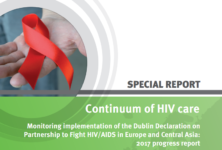NHS England is challenging high court ruling that it has power to commission ‘game-changing’ prevention strategy
A legal battle is being fought out in the court of appeal over who pays the bill for a service to block HIV infection.
The high court ruled that NHS England has the power to commission PrEP, which has been described as a “game-changer” in the fight against HIV/Aids.
NHS England is appealing on the grounds that local authorities have the legal responsibility to arrange services to “prevent” the spread of HIV, while its own responsibilities are limited to treating those already assumed to be infected.
PrEP, short for “pre-exposure prophylaxis”, is a prevention strategy that involves people who are HIV-negative but at high risk of infection taking the anti-retroviral drug Truvada to reach optimal levels of protection.
The anticipated cost of providing PrEP services is £10m-£20m a year.
When taken consistently, it has been shown to reduce the risk of HIV infection in people who are at high risk by more than 90%.
The legal battle is important and urgent because of its potential impact on the provision of other services, including hearing implants for children with deficient or missing auditory nerves, prosthetics for lower limb loss, and a drug for treating certain mutations in children aged two to five with cystic fibrosis.
Nine new treatments and services NHS England had planned to make available to patients have been put on hold pending the outcome of the appeal.
In May this year NHS England’s specialist services commissioning committee decided not to commission PrEP, saying it lacked power to do so under NHS legislation and regulations.
But Mr Justice Green, sitting in London’s high court, ruled on 2 August that it did have the power under the NHS Act 2006 and under regulations made in 2012 which came into effect in April 2013. The ruling was a victory for the National Aids Trust (NAT), a charity, with backing from the Local Government Association (LGA).
Jonathan Swift QC, appearing for NHS England, is asking the appeal judges – Lord Justice Longmore, Lord Justice Underhill and Lady Justice King – to rule the high court decision wrong in law and to conclude that provision of PrEP services does indeed fall outside NHS England’s legal powers.
Swift said the case was a matter of general public importance because it involved the balancing of the division of health responsibilities between NHS England, the health secretary and local authorities. The QC drew a distinction between “PrEP” and “PEP”. He said NHS England has provided PEP – the post-exposure prophylactic service – since 2013.
He described PEP as an emergency service provided in cases where there was “an assumption” that the person being treated was HIV-infected at the time of treatment – in contrast to PrEP, which was for people not infected.
Mr Swift argued the 2012 regulations only required NHS England to provide services, for patients already believed to be infected. Responsibility for funding PrEP fell to local authorities since they were under an express obligation to make arrangements for services to prevent the spread of sexually transmitted infections, including HIV.
The high court judgment which is being challenged said the case was about “the allocation of budgetary responsibility in the health field”.
Mr Justice Green said: “No one doubts that preventative medicine makes powerful sense. But one governmental body says it has no power to provide the service and local authorities say they have no money.
“The claimant is caught between the two and the potential victims of this disagreement are those who will contract HIV/Aids but who would not were the preventative policy to be fully implemented.
“In my judgment the answer to this conundrum is that NHS England has erred in deciding that it has no power to commission the preventative drugs in issue.”
Alternatively, said the judge, NHS England has “mischaracterised the PrEP treatment as preventative when in law it is capable of amounting to treatment for a person with infection”. In any event NHS England had the power to commission preventative treatments because that facilitated, or was incidental to, “the discharge of its broader statutory functions”.
NHS England is asking the appeal court to rule the high court wrong on all counts. Campaigners have said that while the majority of gay men use condoms to prevent being infected with HIV, there is also an “ethical duty” to provide PrEP to those who do not. And they say the drug would provide an additional defence against HIV, and would not be used simply as an alternative to safe sex.


 ПОИСК ПО САЙТУ
ПОИСК ПО САЙТУ  поиск по ресурсному центру
поиск по ресурсному центру 


